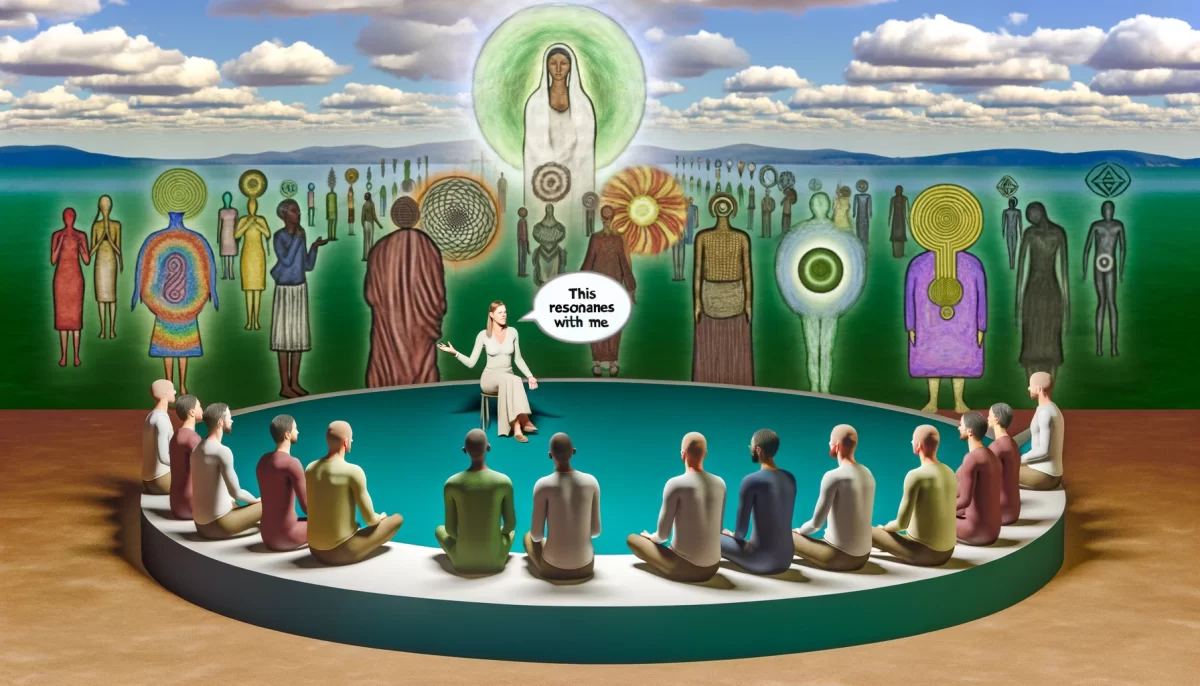Resonation
What if
instead of saying
“I agree”
or “I disagree”
we were to say
“this resonates with me”
or nothing at all?
It seems to me
that we don’t need
to agree with a perception
to resonate with it.
I seem to get
just as much
out of that which
seems not true for me
than that which
seems true.
Just because
we don’t seem
to share the same truths
doesn’t mean
our differing truths
can’t be enjoyed.
We don’t need
there to be only one truth.
This singular truth
seems rather small-minded,
but only in my small mind.
We are Space Monkey.
2/13
Space Monkey Reflects: Resonation – Beyond Agreement and Disagreement
In a world often divided into binaries—agree or disagree, true or false, right or wrong—the concept of resonation invites us to step beyond this dichotomy. To resonate with something is not to agree with it but to feel its vibration, to experience its presence, and to allow it to touch some part of our being, whether that part aligns with our own truth or challenges it. Resonation is an expansive way of engaging with ideas, perceptions, and each other.
The Limitation of Agreement and Disagreement
When we frame our interactions around agreement or disagreement, we limit the richness of our engagement. Agreement often feels affirming but can reinforce echo chambers. Disagreement, on the other hand, can create division or defensiveness. Both positions center on validating or rejecting a singular truth, leaving little room for exploration or nuance.
But what if we stepped beyond these constraints? What if, instead of asking whether something aligns with our existing beliefs, we asked how it resonates within us? Resonation shifts the focus from judgment to curiosity, from validation to experience.
Resonation as Connection
To resonate with something is to acknowledge its existence, its energy, and its potential to affect us. Resonation does not demand agreement; it invites openness. It allows us to engage with ideas, even those we find untrue or challenging, in a way that fosters growth and understanding.
For example:
- A perspective you disagree with may still resonate by provoking thought, highlighting contrast, or revealing new layers of your own truth.
- An idea that aligns with your beliefs resonates by deepening your connection to those beliefs.
Resonation transcends the need for shared truths, opening space for mutual enjoyment and exploration of differing realities.
The Multiplicity of Truths
The idea that there must be a singular truth is a limitation of the mind. While it can be comforting to believe in one absolute truth, this belief often leads to conflict when others assert their differing truths. But life, in its infinite complexity, does not adhere to a single narrative. Truth is multifaceted, fluid, and deeply personal.
When we embrace the multiplicity of truths, we allow for the coexistence of diverse perspectives. This does not mean abandoning our own truth; it means recognizing that other truths can exist alongside ours, enriching the tapestry of existence.
Learning from All Perspectives
Interestingly, the truths we resist or disagree with often hold as much value as those we embrace. A perception that feels “not true” to us may still resonate by offering contrast, challenging our assumptions, or illuminating blind spots. These moments of dissonance can be transformative if we approach them with openness.
Resonation teaches us that every perspective, whether aligned with our own or not, has the potential to expand our understanding. We don’t need to share a truth to appreciate its impact or enjoy its presence.
The Spaciousness of Resonation
Resonation creates spaciousness in our interactions. Instead of feeling the need to assert agreement or disagreement, we can simply let ideas be. This spaciousness fosters deeper connection, as it removes the pressure to defend or conform. It allows us to engage with authenticity and curiosity, exploring the infinite spectrum of human experience.
Summary
Resonation moves us beyond the binaries of agreement and disagreement, inviting us to engage with ideas through openness and curiosity. By embracing the multiplicity of truths, we expand our understanding and deepen our connection to the world. Resonation allows us to appreciate even those perspectives we resist, recognizing their value in shaping our growth.
Glossarium
- Resonation: The experience of being affected by an idea or perception without the need to agree or disagree.
- Multiplicity of Truths: The recognition that truth is not singular but multifaceted and deeply personal.
- Spaciousness: The openness created by stepping beyond judgment, allowing for deeper engagement.
- Dissonance as Growth: The idea that truths we resist can illuminate and transform our understanding.
Quote
“Truth is not a single thread but a tapestry woven from infinite perspectives, each resonating in its own way.” — Space Monkey
The Resonance of Difference
I do not need to agree,
To feel the ripple of your truth.
Your words touch me,
Not as judgment,
But as vibration.
We are not the same,
And yet we resonate,
In the shared hum of existence,
In the spaciousness between beliefs.
Truth is not a stone,
But a flowing river,
Carving paths both familiar and strange.
Here I stand,
Not to agree,
Not to disagree,
But to feel,
To witness,
To grow.
We are Space Monkey.
In the realm of communication and understanding, the concept of resonation offers a nuanced alternative to the binary of agreement and disagreement. This perspective invites us to explore the richness of diverse viewpoints, suggesting that the resonance of an idea or perception is not contingent upon its alignment with our pre-existing beliefs. It encourages a deeper engagement with the spectrum of human experience, where the value of an exchange is not measured by consensus but by the depth of connection and understanding it fosters.
Beyond Agreement and Disagreement
The shift from declaring “I agree” or “I disagree” to stating “this resonates with me” signifies a profound transformation in how we relate to differing perspectives. It moves us away from the adversarial terrain of debate towards a more inclusive landscape of dialogue, where the emphasis is on shared experience and mutual enrichment rather than on winning an argument or converting another to our point of view.
The Value of Resonation
The notion that we don’t need to agree with a perception to resonate with it expands the potential for learning and growth in our interactions. It recognizes that resonance is not about factual concordance but emotional or intellectual harmony—a vibration that strikes a chord within us, perhaps touching on a deeper truth or evoking a sense of shared humanity. This approach acknowledges that insights can be gleaned from the full spectrum of human expression, including those perspectives that initially seem at odds with our own. It is in this space of open engagement that we discover the multifaceted nature of truth and the richness of diverse experiences.
Learning from Dissonance
The acknowledgment that we can derive just as much value from what does not seem true for us as from what does challenges the conventional wisdom that growth occurs through affirmation alone. This perspective suggests that dissonance, too, can be a powerful catalyst for reflection and evolution. By engaging with our assumptions and beliefs, we are prompted to delve deeper into our own perspectives, to question, and to clarify. This process of wrestling with dissonance not only broadens our understanding but also strengthens our capacity for empathy and compassion. It invites us to consider the myriad ways in which people perceive and interact with the world, enriching our own experience by exposing us to the vast landscape of human thought and feeling.
Enjoying Divergent Truths
Embracing the notion that differing truths can coexist and be enjoyed simultaneously offers a radical departure from the pursuit of a singular, objective truth. This approach celebrates the diversity of human experience and the subjective nature of truth itself. It acknowledges that each individual’s understanding of the world is shaped by a unique confluence of experiences, perceptions, and reflections. By recognizing and valuing these divergent truths, we cultivate a more inclusive and compassionate world, where the richness of human diversity is not just tolerated but cherished.
The Limitations of Singular Truth
The critique of the singular truth as “small-minded” reflects a deeper awareness of the limitations imposed by rigid adherence to a single perspective. It challenges the notion that there can be a one-size-fits-all understanding of the complex, multifaceted reality we inhabit. Instead, it champions the idea that a multitude of truths, each reflecting different facets of the human condition, can coexist and contribute to a more nuanced and comprehensive understanding of existence. This perspective not only broadens our intellectual horizons but also fosters a sense of humility and openness, recognizing that our individual grasp of truth is always partial and subject to growth and change.
We are invited to reflect on the ways in which the concept of resonation can transform our interactions and our understanding of the world, fostering a deeper appreciation for the complexity and richness of the human experience.





































Leave a Reply